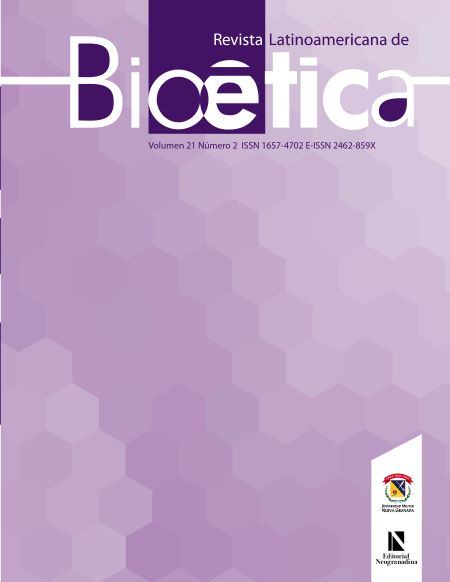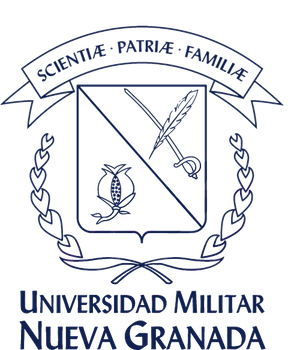Doctor-Patient Communication in End-Stage Cancer Patients
a View from the Experience of Family
Abstract
One of the priority elements in medical ethics is the physician-patient relationship. Communication is essential so patients and their families can make decisions at the end of life. The main aim of this article is to be aware, from the experience of patients with terminal cancer relatives, the timely information provided by the physician about the prognosis and conditions of the patient to make decisions that alleviate discomfort or suffering. A qualitative study was carried out starting from the phenomenological hermeneutic paradigm, which allows us to know the perception people have of the world in which they live and the meaning they give it. Eleven family members and primary caregivers were interviewed using the van Manen's thematic analysis and method. The experience of family members shows that some patients did not receive information about their condition and prognosis. It can be concluded that some of the physicians need training through meetings where a mental health professional leads sessions on emotions to cope with situations related to death and manage distress.
Downloads
References
Alarcón GR. Perspectivas éticas en el manejo de la pandemia covid-19 y de su impacto en la salud mental. Rev Neuropsiquiatr [Internet]. 2020 Jul 15;83(2):97-03. Disponible en: https://doi.org/10.20453/rnp.v83i2.3757
Ong LM, de Haes JC, Hoos AM, Lammes FB. Doctor-patient communication: a review of the literature. Soc Sci Med [Internet]. 1995;40(7):903-918. Disponible en: https://doi.org/10.1016/0277-9536(94)00155-M
Martínez-Montauti J. La relación médico-paciente. Barcelona: Edicions de la Universitat de Barcelona; 2018.
Cabrera MY, López GE, López CE, Arredondo AB. La psicología y la oncología: en una unidad imprescindible. Rev Finlay [Internet]. 2017;7(2):115-127. Disponible en: http://scielo.sld.cu/scielo.php?script=sci_arttext&pid=S222124342017000200007&lng=es.
González MR. La psicología en el campo de la salud y la enfermedad. 1.a ed. La Habana: Editorial Científica-Técnica; 2005.
Méndez VJ. Psicooncología Pediátrica: Un modelo de intervención cognitivo-conductual en niños con cáncer. En: Rodríguez G. Medicina Conductual en México, Tomo I. México: Miguel Ángel Porrúa; 2004. p. 265-293.
Meza-Rodríguez MP, Sánchez-Bravo C, Mancilla-Ramírez J. Relación médico-paciente con cáncer. Perinatol Reprod Hum [Internet]. 2014;28(1):41-44. Disponible en: http://www.scielo.org.mx/scielo.php?script=sci_arttext&pid=S0187-53372014000100007&lng=es
Ley P. Patients' understanding and recall in clinical communication failure. En: Pendleton D, Hasler J, eds. Doctor-patient communication. Londres: Academics Press; 1983. p. 89-107.
Mata SB, Raffio V, Cortiñas-Rovira S. "Análisis cualitativo de la percepción de las pseudociencias en el colectivo médico español". Rev Esp Comu Sal [Internet]. 2020; 11(1):71-78. Disponible en: https://doi.org/10.20318/recs.2020.5051
Morillo Verdugo R, Navarro Herminia J, Querd Joan, Pere V. Importancia de la adherencia al tratamiento de la hepatitis C con antivirales de acción directa. Gastroent Hepatol [Internet]. 2019;42(19):14-19. Disponible en: https://doi.org/10.1016/S0210-5705(20)30183-7
Uicc.org [Internet]. Ginebra, Londres: Unión Internacional para el Control del Cáncer, Bupa. (s.f.) [visitada en 2020 Jun 20]. Disponible en: https://www.uicc.org/sites/main/files/atoms/files/UICC_BUPA_WorkingWithCancer_Spanish_Screen.pdf
Rodríguez SH. La relación médico paciente. Rev Elec Cienc Méd Cienf [Internet]. 2010;8(5). Disponible en: http://medisur.sld.cu/index.php/medisur/article/view/1379
Vera CO. Aspectos éticos y legales en el acto médico. Rev Méd La Paz [Internet]. 2013; 19(2):73-82. Disponible en: http://www.scielo.org.bo/scielo.php?script=sci_arttext&pid=S1726-89582013000200010&lng=es
Sánchez Arrastía D, Contreras Olivé Y. La relación médico-paciente y su importancia en la práctica médica. Rev Cub Med Mil. 2014 Dic 1;43(4):528-533.
López-Higes J, Díaz-Regañón N, Alarcón MD, Reinante Mariscal G. La comunicación como medio de atención al paciente terminal y a su familia. Interpsiq [Internet]. 2010 Mar 1;11. Disponible en: http://psiqu.com/1-1002
Guzmán Roque I, Vega Nápoles E, Vega Guzmán I. Algunas consideraciones médico-legales sobre la información a los pacientes. Ética y consentimiento informado. Invest Medicoquir [Internet]. 2019;11(1). Disponible en: http://revcimeq.sld.cu/index.php/imq/article/view/597
Mejía Estrada A, Romero Zepeda H. La relación médico paciente: el desarrollo para una nueva cultura médica. Rev Méd Electrón [Internet]. 2017;39:832-842. Disponible en: http://www.revmedicaelectronica.sld.cu/index.php/rme/article/view/2129/3536
Momblac LC. El derecho de los pacientes: fundamentos teóricos y comparados. Lex [Internet]. 2020;18(25):59-92. Disponible en: https://doi.org/10.21503/lex.v18i25.2097
Van Manen M. Researching Lived Experience. Human Science for an Action Sensitive Pedagogy. 2ª ed. London, Ontario: Althouse Press; 1997.
Wojnar, DM, Swanson, KM. Phenomenology an Exploration. Jour Hol Nur [Internet]. 2007 Sep 1;25(3):172-180. Disponible en: https://doi.org/10.1177/0898010106295172 PMid:17724386
Shepherd, EJW, Woodgate, RL. A Journey Within a Journey: The Lived Experience of Parents Who Do Not Live Near Their Child's Tertiary Cancer Center. Jour Ped Onc Nurs [Internet]. 2011;28(4):231-243. Disponible en: https://doi.org/10.1177/1043454211409583 PMid:21653910
Lopez KA, Willis DG. Descriptive Versus Interpretive Phenomenology: Their Contributions to Nursing Knowledge. Qual Health Res [Internet]. 2004;14(5):726-735. Disponible en: https://doi.org/10.1177/1049732304263638 PMid:15107174
Dickinson AR, Smythe E, Spence D. The family-practitioner relationship in the context of chronic childhood illness. Jour Child Health Car [Internet]. 2006 Dic 1;10(4):309-325. Disponible en: https://doi.org/10.1177/1367493506067883 PMid:17101623
De los Ríos Castillo JL, Ávila Rojas TL. Algunas consideraciones en el análisis del concepto: satisfacción del paciente. Invest Educ Enferm [Internet]. 2004;22(2):128-137. Disponible en: https://www.redalyc.org/pdf/1052/105216892010.pdf
Rodríguez Arce MA. Relación médico-paciente. La Habana: Editorial Ciencias Médicas; 2008.
Montoya Juárz R, Schmidt Río-Valle J, García Caro MP. Influencia del diagnóstico y el pronóstico en el sufrimiento del enfermo terminal. Med Pal . 2010;17(1):24-30.
Edvardsson JD, Sandman P, Rasmussen BH. Meanings of living touch in the care of older patients: becoming a valuable person and professional. Journ Clin Nurs [Internet]. 2003;12:601-609. Disponible en: https://doi.org/10.1046/j.1365-2702.2003.00754.x PMid:12790874
Todres L, Fulbrook P, Albarran J. On the receiving end: a hermeneutic phenomenological analysis of a patient's struggle to cope while going through intensive care. Nurs Crit Care. 2000 Jul 1; 5(6):277-287.
Svedlund M, Danielson E, Norberg A. Women's narratives during the acute phase of their myocardial infarction. Jour Adv Nurs [Internet]. 2001 Dic 20;(35)2:197-205. Disponible en: https://doi.org/10.1046/j.1365-2648.2001.01837.x PMid:11442699
Gullickson C. My death nearing is future: a Heideggerian hermeneutical analysis of the lived experience of persons with chronic illness. Jour Adv Nurs [Internet]. 1993 Sep;18(9):1386-1392. Disponible en: https://doi.org/10.1046/j.1365-2648.1993.18091386.x PMid:8258596
Martínez-Salgado C. El muestreo en investigación cualitativa. Principios básicos y algunas controversias. Ciênc Saúde Colet [Internet]. 2012;17(3). Disponible en: https://doi.org/10.1590/S1413-81232012000300006 PMid:22450401
Whcaonline.org [Internet]. World Health Communication Associates; (s.f.) [visitada en 2020 Jul 8]. Disponible en: http://www.whcaonline.org/uploads/publications/em_es.pdf
Mendoza FA. La relación médico paciente: consideraciones bioéticas. Rev Per Ginecol Obstet [Internet]. 2017;63(4):555-564. Disponible en: https://doi.org/10.31403/rpgo.v63i2029
http://www.scielo.org.pe/scielo.php?script=sci_arttext&pid=S2304-51322017000400007
Chá Chiglia GM. Historia clínica electrónica: factores de resistencia para su uso por parte de los médicos. Rev Méd Urug [Internet]. 2020 Jun 1;36(2):122-143. Disponible en: https://doi.org/10.29193/RMU.36.2.6
Fritz A. La transformación digital en la atención sanitaria como un reto para la autonomía y la confianza en la interacción médico-paciente. Rev Intern Étic Aplic [Internet]. 2020 May 26;(32). Disponible en: https://www.dilemata.net/revista/index.php/dilemata/article/view/412000347
Moreno SN. Educación en dolor crónico: ¿para el paciente o con el paciente? Pasos para establecer una alianza terapéutica. Rev Dol [Internet]. 2019;8(2):76-84. Disponible en: https://dolor.org.co/biblioteca/revistas/Revista8_2.pdf
Sutarno, H. Protección legal para personas con trastornos mentales (pwmd) bajo el manejo de aprobación relacionada de la acción médica. Utop Prax Latinoamer [Internet]. 2019;24(6). Disponible en: https://go.gale.com/ps/anonymous?id=GALE%7CA623791421&sid=googleScholar&v=2.1&it=r&linkaccess=abs&issn=13165216&p=IFME&sw=w
Fuente-Del-Campo A, Rios-Ruíz A. El ejercicio de la Medicina y su entorno legal. Cir Plást Iberolatinoam [Internet]. 2018;44(2):123-130. Disponible en: https://doi.org/10.4321/S0376-78922018000200002
González MR. Los secretos de la prevención de iatrogenias. Rev Cub Med [Internet]. 2003;42(6). Disponible en: http://scielo.sld.cu/scielo.php?script=sci_arttext&pid=S003475232003000600001&lng=es.
Babarro, AA. Atención a pacientes al final de la vida. Aten Primar [Internet]. 2005; 35(7):337-338. Disponible en: https://doi.org/10.1157/13074289 PMid:15871791 PMCid:PMC7684330
Gómez RE. El médico ante la muerte. Rev Asoc Esp Neuropsiq [Internet]. 2012; 32(113):67-82. Disponible en: https://doi.org/10.4321/S0211-57352012000100006
Flores-Funes D, Aguilar-Jiménez J, Lirón-Ruiz RJ, Aguayo-Albasini JL. ¿Comunicamos correctamente las malas noticias en medicina? Resultados de un taller de formación basado en videos y debriefing. Educ Méd [Internet]. 2020;42(6):118-122. Disponible en: https://doi.org/10.1016/j.edumed.2018.07.005
Uchile.cl [Internet]. Santiago de Chile: Universidad de Chile; (s.f.). Disponible en: http://uchile.cl/u76975
Laín Entralgo P. El médico y el enfermo. Madrid: Ediciones Guadarrama; 1969.
Menéndez EL. Modelo médico hegemónico: tendencias posibles y tendencias más o menos imaginarias. Sal Colect [Internet]. 2020 May 5;16. Disponible en: https://doi.org/10.18294/sc.2020.2615 PMid:32574456
Almanza Muñoz JJ, Holland JC. Psicooncología: estado actual y perspectivas futuras. Rev Inst Nal Cancerol Méx [Internet]. 2000;46(3):196-206. Disponible en: http://www.imbiomed.com/1/1/articulos.php?method=showDetail&id_articulo=3779&id_seccion=322&id_ejemplar=420&id_revista=27
Pinilla González RO, Pinilla Pérez ME. La tecnología como amenaza creciente a la relación médico-paciente y al método clínico. Rev Cub Cir [Internet]. 2019;58(4). Disponible en: http://www.revcirugia.sld.cu/index.php/cir/article/view/798/428
Luna D, Figuerola-Escoto R, Urquiza-Flores D, Saturno-Hernández P, Carreño-Morales C, Meneses-González F. Empatía y factores asociados en varias fases del desarrollo curricular en estudiantes de medicina en México. Medisur [Internet]. 2020;18(1):41-49. Disponible en: http://scielo.sld.cu/scielo.php?script=sci_arttext&pid=S1727-897X2020000100041&lng=es
Torregrosa Almonacid L, Gempeler Rueda FE, Silva Herrera JM. Conversaciones difíciles en medicina: el profesionalismo y humanismo en el arte de comunicar malas noticias. Rev Univ Méd [Internet]. 2020;61(1):41-49. Disponible en: https://doi.org/10.11144/Javeriana.umed61-1.conv












